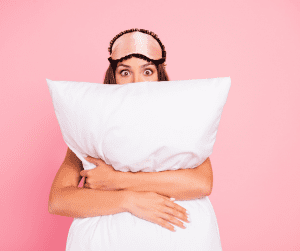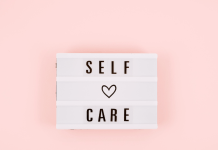Good Sleep and Moms
As a mom, getting quality sleep is one of those long lost memories. I underestimated the cost sleep deprivation would have on my body. All the advice I received to “sleep while the baby sleeps” and “letting the baby cry it out” never really worked out for me. When the baby slept, I was working or finishing up some household chores. “Letting the baby cry it out” made my stress hormones sky rocket. For me, it felt unnatural.
Now as a mother of teenagers, there’s no more nighttime feedings. However, there’s a new level of worry when waiting for them to come home before curfew. My sleep continues to be disrupted. As a Health Coach, I see many folks dealing with sleep issues. There is no magical solution, like most habits, healthy sleep also takes work.
Sleep is a Cornerstone of Good Health
Clearly, we all know when we’ve had a terrible night’s sleep. If you are hitting snooze at least once, that can be an indicator of poor quality sleep. Other key symptoms of poor sleep could be irritability, forgetfulness, weight gain, reduced immune function, accidents (like in a car or in your kitchen), an increase in inflammation and low sex drive.
How could a regular, quality sleep schedule improve our sleep? It could improve our mood. That benefit right there could lead to so many great things. If I’m feeling well-rested, I’m more likely to get in my workout, be nicer to my family and get my work tasks completed. Getting better sleep could also improve our immune systems, help us lose weight (if we are working on that habit), and reduce inflammation. Some research also shows it reduces our risks for most major diseases such as Heart Disease and Alzheimers.
The Science-y Stuff
What makes us sleep? There’s this fancy gland located deep inside the brain that can magically sense light and dark. This gland is key to our sleep cycles and secretes Melatonin, the hormone that induces sleep. Wow. Enter artificial light, cell phones and TVs. All of these things interfere with our pineal gland trying to do its job. More on that later.
Making Sleep a Priority
It seems like sleep is always on the back burner. I can eat my veggies, drink my water, and usually get in the exercise, but getting enough sleep or quality sleep is not always high on the list. Improving our sleep will not happen by accident. Just like any other healthy habit that we are working on, we need a plan.
Here are a few steps that could lead you into dreamland and over time, help you wake up refreshed.
- A sleep journal
- Using this to track your sleep habits, you may discover a few habits that are interfering.
- Create a bedtime ritual
- turn the lights low (think pineal gland)
- low stimulation
- remove screens at least one hour before you want to be asleep
- meditation or prayer
- Create a morning routine
- If you have little ones, planning to get up even 5 minutes before they usually wake up is a game changer.
- Work on waking at the same time each day, even weekends (sorry)
- Exercise or activity first thing in the morning is a great way to wake up.
- Consider if you are an owl or a lark – this is your body’s natural sleep cycle. Slightly adjust your bedtime/waking time to better fit your chronotype if possible.
- Power naps & passive rest
- A power nap should be no more than 20 minutes, otherwise you could wake feeling groggy
- Passive rest is where you take a few minutes to close your eyes and practice deep breathing, with no sleep
- Take a look at your dietary intake
- What and how we are eating can interfere with sleep patterns.
Stress & Sleep
Sometimes it’s not our routine getting in the way of quality sleep. Stress greatly impacts our ability to sleep well. These two are delicately intertwined and can greatly impact one another. More stress can equal less sleep, but less sleep can also lead to more stress. It’s a vicious cycle. Our stress never really goes away, it is always there. Finding ways to effectively cope with our stress can improve sleep.
The Alcohol & Caffeine Cycle
Many people that I’ve worked with who experience poor sleep, their morning routine includes several cups of coffee to “wake up”, and the nighttime routine includes a glass of wine to “help get to sleep”. This is a cycle that is not easily broken. Here’s a quick biochemistry lesson about how caffeine and alcohol impact sleep.
All chemicals have a “half-life” which is the time it takes for it to leave your body. Caffeine has been so well studied, and the research shows that depending on the person, the half-life of caffeine is 2-12 hours. Since caffeine is a stimulant, it’s not surprising that it could be interfering with sleep. Avoiding caffeine after noon is a good rule of thumb for improving sleep habits.
Alcohol, on the other hand, is a depressant, which we would think would help with sleep, right? It might make us feel more sleepy at first, but alcohol greatly disrupts our sleep cycle during the night in a whole bunch of ways. It is recommended to avoid alcohol 3 hours before sleep time.
What about Sleep Products?
After taking an evaluation of my sleep habits about 10 years ago, I’ve learned that there are some sleep aids that actually do help.
Do you have a light shining in your room? Wear an eye mask. Shop around until you find the right fit, this has been a game changer for me. Remember the pineal gland? If you are not letting in any light, in theory, that pineal gland can function properly.
Do you sleep next to someone that snores? Try earplugs. Of course use caution if you need to hear a baby monitor, and I personally never use ear plugs if I am the only adult in the house at night.
Some doctors recommend an over the counter Melatonin supplement. Talk with your doctor, but most are considered safe. This supplement is especially helpful when traveling. Again, use caution if you are caring for small children.
Enter Sandman
I could have never anticipated how becoming a mom would truly affect my sleep. I’m not complaining, it’s just a fact that I never really thought about before having children. Becoming a doctor, pilot, nurse, police officer and other careers that require irregular sleep patterns never appealed to me. I love to sleep. It’s one of my favorite things. I struggle when I am not sleeping well and I have worked hard on creating a healthy sleep environment. Please don’t feel like your sleep patterns are fixed. We all have room for improvement in our sleep spaces. Never underestimate the power of a good night’s sleep.
After evaluating your sleep routine you think you may suffer from a sleep disorder, please seek medical help.


















